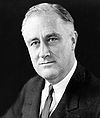
Homeowners Refinancing Act
Encyclopedia

Act of Congress
An Act of Congress is a statute enacted by government with a legislature named "Congress," such as the United States Congress or the Congress of the Philippines....
of the United States
United States
The United States of America is a federal constitutional republic comprising fifty states and a federal district...
passed as part of Franklin Delano Roosevelt's New Deal
New Deal
The New Deal was a series of economic programs implemented in the United States between 1933 and 1936. They were passed by the U.S. Congress during the first term of President Franklin D. Roosevelt. The programs were Roosevelt's responses to the Great Depression, and focused on what historians call...
during the Great Depression
Great Depression
The Great Depression was a severe worldwide economic depression in the decade preceding World War II. The timing of the Great Depression varied across nations, but in most countries it started in about 1929 and lasted until the late 1930s or early 1940s...
to help those in danger of losing their homes. The act, which went into effect on June 13, 1933, provided mortgage assistance to homeowners or would-be homeowners by providing them money or refinancing mortgages.
Sponsored by Senate Majority leader Joe Robinson of Arkansas, it also created the Home Owners' Loan Corporation
Home Owners' Loan Corporation
The Home Owners' Loan Corporation was a New Deal agency established in 1933 by the Home Owners' Loan Corporation Act under President Franklin D. Roosevelt. Its purpose was to refinance home mortgages currently in default to prevent foreclosure. This was accomplished by selling bonds to lenders in...
(HOLC), building off of Herbert Hoover's
Herbert Hoover
Herbert Clark Hoover was the 31st President of the United States . Hoover was originally a professional mining engineer and author. As the United States Secretary of Commerce in the 1920s under Presidents Warren Harding and Calvin Coolidge, he promoted partnerships between government and business...
Federal Loan Bank Board. The Corporation lent low-interest money to families in danger of losing their homes to foreclosure. By the mid 1930s, the HOLC had refinanced nearly 20% of urban homes in the country.
New Deal
Having won a decisive victory in the United States presidential election of 1932United States presidential election, 1932
The United States presidential election of 1932 took place as the effects of the Wall Street Crash of 1929, the Smoot-Hawley Tariff Act of 1930, the Revenue Act of 1932, and the Great Depression were being felt intensely across the country. President Herbert Hoover's popularity was falling as...
, and with his party having decisively swept Congressional elections across the nation, Roosevelt entered office with unprecedented political capital
Political capital
Political capital is primarily based on a public figure's favorable image among the populace and among other important factors in or out of the government. Political capital is essentially the opinion of another person, group of people, or nation about you, your organization, or your government...
. Americans of all political persuasions were demanding immediate action, and Roosevelt responded with a remarkable series of new programs in the “first hundred days” of the administration, in which he met with congress for 100 days. During those 100 days of lawmaking, Congress granted every "request" Roosevelt asked.
Congressional
The original Home Owners' Loan Act of 1933, , , was enacted June 13, 1933. The 1st Annual Report of the Federal Home Loan Bank BoardFederal Home Loan Bank Board
The Federal Home Loan Bank Board was a board created by the Federal Home Loan Bank Act of 1932 that created and oversaw the Federal Home Loan Banks also created by the act. It was superseded by the Federal Housing Finance Board and the Office of Thrift Supervision in the Financial Institutions...
refers to this act as the Home Owners' Loan Corporation Act. An unnamed act, , further amended this act to guarantee the bonds of the Home Owners' Loan Corporation.

